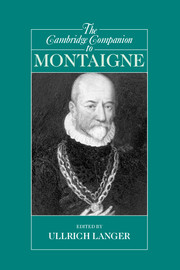Book contents
- Frontmatter
- 1 Introduction
- 2 Montaigne’s political and religious context
- 3 Montaigne’s legacy
- 4 Montaigne and antiquity
- 5 The Essays and the New World
- 6 Justice and the lawlaw: on the reverse side of the Essays
- 7 Montaigne and the notion of prudence
- 8 Montaigne and the truth of the schools
- 9 The investigation of nature
- 10 Montaigne and skepticism
- 11 Montaigne on moral philosophy and the good life
- Bibliography
- Index
6 - Justice and the lawlaw: on the reverse side of the Essays
Published online by Cambridge University Press: 28 May 2006
- Frontmatter
- 1 Introduction
- 2 Montaigne’s political and religious context
- 3 Montaigne’s legacy
- 4 Montaigne and antiquity
- 5 The Essays and the New World
- 6 Justice and the lawlaw: on the reverse side of the Essays
- 7 Montaigne and the notion of prudence
- 8 Montaigne and the truth of the schools
- 9 The investigation of nature
- 10 Montaigne and skepticism
- 11 Montaigne on moral philosophy and the good life
- Bibliography
- Index
Summary
At the beginning of the chapter “Of Experience” (iii.13), the last of the Essays, Montaigne completes his critique of kinds of knowledge with an indictment against jurisprudence, the science of deceptive comparisons between “cases” which cannot be reduced to legal rules, and against, more generally, the defects of the legal order - “There is nothing so grossly and widely and ordinarily faulty as the laws” (iii.13, F821,V1072) - with their consequences, “condamnations plus crimineuses que le crime” (condemnations more criminal than the crime) (F820, V1070-71). These attacks are obviously inspired by his own very strong requirement for justice: in other words, by his desire to see the virtue of justice being put into practice. This virtue should inspire legislators and judges, and determine social relations; the philosopher observes with bitterness that such is not the case: “we call 'justice' the hodgepodge of the first laws that fall into our hands, and their application and practice, often very inept and very iniquitous” (ii.37, F580, V766); and if he remarks immediately that “those who ridicule it and accuse it do not thereby intend to malign that noble virtue, but only to condemn the abuse and profanation of that sacred title” (ibid., F 580-81, V 766), his critique of judicial institutions is all the more severe. Montaigne accuses these institutions of discrediting by a kind of sacrilege the ethical and political principle whose pre-eminence they are intended to ensure. It was long thought that Montaigne's systematic rejection of everything deriving from the law arose from some sort of personal repugnance, and perhaps also from incompetence. One of his biographers, Roger Trinquet, even questioned his study of law.
- Type
- Chapter
- Information
- The Cambridge Companion to Montaigne , pp. 96 - 117Publisher: Cambridge University PressPrint publication year: 2005
- 5
- Cited by

